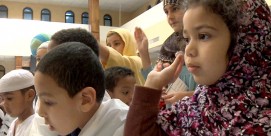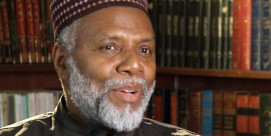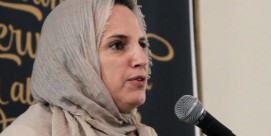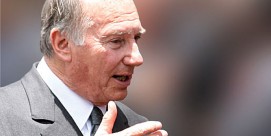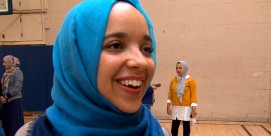KIM LAWTON: We're now continuing a conversation we began on our broadcast with Dalia Mogahed, a Muslim American scholar and director of research at the Institute for Social Policy and Understanding. And Father Thomas Reese, senior analyst at National Catholic Reporter and a commissioner on the US Commission on International Religious Freedom. Tom, your commission deals with international religious freedom and liberties around the world. What implications could this conversation we're having in this country have on your work?
FATHER THOMAS REESE (National Catholic Reporter): Well, it hurts our work tremendously. I mean here, the United States is trying to encourage religious freedom, encourage countries like Saudi Arabia to allow Christian worship in their country. And then here, we're not observing and respecting religious liberty here by singling out Muslims for discrimination. So this does not help us in our efforts to be supportive of religious freedom around the world, because our own credibility—you know, "Who are you to talk about this? You got Donald Trump running around saying all these absurd things." So it hurts our ability to push this message and to push our agenda of religious freedom all over the world.
LAWTON: I'm hearing from sources and friends inside the Muslim world, very concerned. They hear all of the rhetoric. They're not as much hearing the statements of people opposing this or interfaith groups expressing solidarity with the Muslim community. Dalia, what are you hearing in terms of the international response?
DALIA MOGAHED (Institute for Social Policy and Understanding): People are very concerned and very afraid and people are calling relatives or friends in the United States and making sure they're safe. So there is this great deal of concern. It really hurts our international image. I think what's really important to understand though is that others who are showing solidarity have to speak up, have to be louder, and have to get their voices heard so that people internationally understand that the United States is made up of many voices. It's not one monolithic voice that is represented by bigotry.
LAWTON: I've also heard some people raising the question about whether if Muslim Americans here, especially maybe younger Muslim Americans, start feeling marginalized, start feeling alienated from the broader culture, does that make it easier for ISIS' message to find a foothold?
MOGAHED: Well, ISIS and other terrorist groups from across the ideological spectrum, whether they're white supremacist terrorist groups, Muslim terrorist groups, they feed on alienation. And that's a really important point I think for us to take into consideration. What they want is to take a young person who doesn't feel like they fit in, who doesn't feel like they have a sense of purpose and to exploit those weaknesses. And so alienating any group can be really a favor to terrorist organizations.
LAWTON: What can the religious community do to address fears? I mean, clearly we've heard some of this is coming out of fear and fear about what might happen, what might happen to my family. What can the religious community do in the fear realm?
REESE: I think it's very important for local religious communities, local churches and mosques, to interact, to work together, to mingle, because once you know someone who is in this community, in another community, and you become friends with them, well then these stereotypes start to fall away. And that is extremely necessary. To have this kind of interreligious dialogue, working together. I mean, even working together on common projects, for example, to help the homeless in your neighborhood. These are kinds of things that Christians and Muslims should be doing together, talking together, working together, becoming friends. This is what undermines the prejudice, undermines the rhetoric that we have, so that when you hear it, you say, "This is nonsense. This is not the person I know!"
LAWTON: Another area where people might be working together but where this has really touched is the issue of refugees, bringing people in, and it's interesting to me how the narrative has shifted. Couple months ago, a month ago, we were talking about this wave of refugees, and there was this outpouring of compassion for all those people, and you saw children and dead little boys that were trying to flee the violence. And there was a sense of compassion. And then how quickly that has changed to a sense of suspicion and fear. What are the implications of all of that if that is where we end up, in this sort of suspicion and fear?
MOGAHED: I think it's a perfect example of how misinformation can really take a grip on the public. I mean, we know that the Paris attacks, and of course this horrible shooting that we just had, had nothing to do with refugees. These refugees are actually fleeing the same violence and terrorism that we saw in Paris. And yet we're shutting our doors on them. Plus if anybody wanted to do us harm, there's much easier ways to get into our country than to be a refugee which has a very long and arduous vetting process. So what does it say about our democracy, the health of our democracy, when misinformation is controlling the way we perceive policy?
REESE: This is very important, I think. We have just thousands and thousands and thousands of people coming into our country who are not vetted as well as these refugees are vetted. They go through a process of over two years of vetting, being interviewed by Homeland Security, the State Department. First of all, they even have to be registered as refugees by the United Nations. They are the most vetted people coming into the United States. And these are the people we're suddenly afraid of? It makes absolutely no sense. These are the people that are running away from ISIS. These are the people who hate it more than anybody else because of what it has done to them. These are our natural allies. These are the people who, when they come to the United States, their kids would probably want to join the army, to go fight these terrorists. And then we're treating them so badly. I mean, this is so counterproductive, so stupid, when we should be seeing this as people that are our allies in this fight against terrorism.
LAWTON: Let me ask you this finally. In the midst of everything that's being talked about, there is a certain irony in that we are talking about these issues maybe on a broader scale than we normally would apart from this situation. I'm seeing more Muslims being quoted on television and newspapers than maybe six months ago. Is there an opportunity here as well as a danger?
MOGAHED: I think there's always an opportunity to interact more, to engage and to get educated. I think it's also really important though that we not let these horrific acts of terrorism and violence around the world become a problem of collective guilt. American Muslims and Muslims more broadly are as horrified as anyone else when they see this, and actually they have a second degree of horrification because it's being done in their name and in the name of their religion. But it's important to keep in mind that ISIS kills more Muslims than anyone else. And so if there was any group, even if they were only self-interested, that would be interested and committed to defeating ISIS, it would be the Muslim community.
REESE: I agree with that totally. The vast majority of people being killed by ISIS are Muslims. It's not Christians. And the other thing that is so important to remember here is that when this issue of collective guilt is…it's absurd. When the IRA was the terrorist organization blowing up buildings, killing people, did we demand that every Irish Catholic in the United States apologize and condemn them every time something like this happened? And yet this is the demand we're making of every American Muslim. What kind of standard is this? What kind of prejudice is this? I think we have to, each of us, if we look back in our families, we find that we're all immigrants. It may have been our grandparents, maybe our great-great-grandparents. And they were probably subject to discrimination and prejudice, whether they were Poles, whether they were Germans, whether they were Jews, Catholics, whoever they were, they came, they were the stranger, they were the people who were looked upon as foreigners and, "Oh they're not going to be loyal Americans." Well, now for us to turn over and suddenly be prejudiced against some newcomers, this is denying our own heritage.
MOGAHED: I completely agree with what Father Reese just said. I would also like to add that actually many Muslims are not immigrants at all. A third, a full third of American Muslims are African Americans and have been here, their ancestors have been here for 400 years and they helped build this country. Islam has been a part of America since its inception. So we often think of it as a new religion, and of course it's new to the public sphere, we didn't talk about Islam very much before, but it's actually not new to our country at all. And I think we need to reframe how we think about Islam. It's really just as American as any other faith.
LAWTON: Great, thank you. We'll leave it there for now but obviously a lot to talk about and we'll keep talking. Thank you again.

